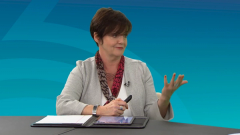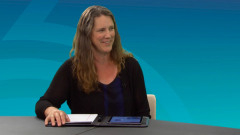
The difference between a basic CBC and a comprehensive CBC
Explaining the differences between both Zoetis Reference Labs' CBC offerings
Episodes in this series

Content sponsored by Zoetis
Adam Christman, DVM, MBA: Now I understand there is the basic CBC and there's a comprehensive CBC. So tell me a little bit about those.
Laura Brandt, DVM, MS, DACVP (Clinical Pathology): That's right. So we have to see CBC hematology is fantastic. So let's just talk about hemotaology the rest of the time.
Adam Christman, DVM, MBA: That's your jam.
Laura Brandt, DVM, MS, DACVP (Clinical Pathology): Yeah, exactly. So we have 2 CBC offerings, we have what we call a basic CBC and we have a comprehensive CBC, the basic CBC. I would really argue we should call it the basic plus, because we do something a little bit extra a little bit special with that, that is our automated CBC offering. So an automated CBC may be appropriate for a healthy animal, a young animal pre anesthetic screening before spay neuter, that sort of thing. However, if you have an ill patient, a geriatric patient, we really need to be funneling those CBCs through the comprehensive CBC pathway. The basic CBC, as I mentioned, is an automated process. So we take a sample, we run it through an analyzer, the analyzer generates data. And that gets put into a report. We have to remember that while our analyzers are top notch reference quality laboratory instruments, they're still machines, right. And so they don't really think about what they're doing. They're, they're analyzing particles have a certain size, a certain texture or certain complexity. And that all gets then transferred into "I think this is a red cell, because the programming engineers told me it was a red cell," right. And so in this instance, we have some additional quality control steps with our automated CBC, because we want to make sure that automated data were giving you that the analyzer may not be interpreting correctly is actually real. And so with our SOPs and our more comprehensive technician training program, they're going to run through a list of double checks on your basic automated CBC. And if necessary, they're going to do some additional steps to really confirm that that information that analyzers giving us is correct.
Adam Christman, DVM, MBA: Wow. Okay, so tell me a little bit about those extra steps. What's involved with that?
Laura Brandt, DVM, MS, DACVP (Clinical Pathology): Yeah, so it might be that we will go through a case as well, which can demonstrate some of this. There's some ancillary data that we get that doesn't show up on your reports. And so we train our technicians to examine this. And if they see that there's interferences, don't, they might do a very quick, limited smear examination, just to look, let's check that platelet count, let's make sure that platelet count was actually accurate. We're not really quite sure that your hemoglobin is matching up. So we're gonna do a packed cell volume because we really want to make sure that we're telling you if your patients anemic or not. So we really want to tie those things up neatly for you guys.
Adam Christman, DVM, MBA: I'm just thinking as a general practitioner too, is there an extra upsell? Or is it already included in terms of having...?
Laura Brandt, DVM, MS, DACVP (Clinical Pathology): What the process I've talked about is absolutely included. That is the basic CDC, however, I want to really stress to everyone that that does not take the place of a comprehensive evaluation of a blood smear. So again, if you have a sick animal, you have an elderly patient, you know, sometimes they appear healthy, but there's a cult disease there. Whenever you're doing those wellness screens in those older patients sick patient, you need to do a comprehensive CBC that includes all of that analysis of the analyzer data. But we're also going to have a technician blood smear review, and it's going to be more comprehensive, it's not that limited, targeted, we're just checking one thing, we're going to look at that whole blood smear, and really give that patient the time and attention it needs. Because again, the analyzers aren't picking up, you know, all of these things, they're not seeing inclusions, they're not gonna assess toxic change, they're not going to see a left shift, they won't see cancer cells. So all these things really need to be evaluated
Adam Christman, DVM, MBA: So with the the basic CBC, what happens if there's something that happens to be flagged, they noticed something?
Laura Brandt, DVM, MS, DACVP (Clinical Pathology): Right, so the technicians will then follow the SOP. It's all all lined out for them. They're highly trained, they know exactly what to look for. And so they might do a targeted exam, again, just assessing one particular thing on that blood smear. However, you know, these are highly trained people. If they're doing this targeted exam, they might see something just it happens to be in their field of view, that that's concerning to them, that that CBC then really needs to go for a comprehensive CBC. So we what we do in that scenario is we alert the clinician through a comment on the basic CBC report to say you really need to upgrade this this really needs to go to a comprehensive CBC. And that's because we really need to shift that blood smear over to a technician who's going to spend that dedicated time with it.
Adam Christman, DVM, MBA: Okay, that's excellent. Wow, wonderful.
Newsletter
From exam room tips to practice management insights, get trusted veterinary news delivered straight to your inbox—subscribe to dvm360.














